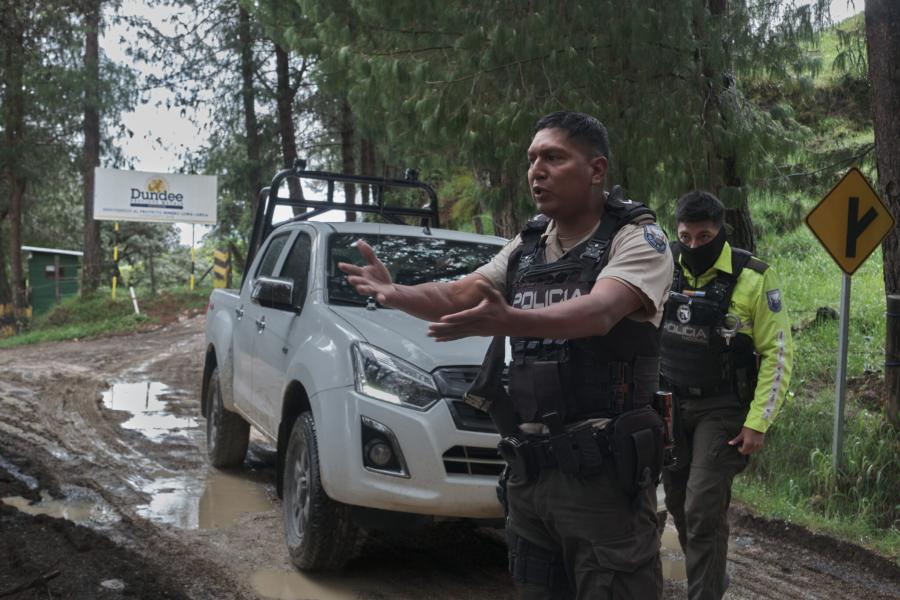Presented to the 22nd session of the United Nations Working Group on Indigenous Populations on July 19 by John Sinclair, senior assistant deputy minister, Canadian Department of Indian Affairs and Northern Development
In Canada, we have successfully completed negotiations on a number of major land claims and self-government agreements.
On August 25, 2003, representatives of the Dogrib Treaty 11 Council, the Government of the Northwest Territories, and the Government of Canada signed the Tlicho Agreement, another important development for the Mackenzie Valley and the Northwest Territories as a whole. The former Prime Minister of Canada, the Honourable Jean Chretien, attended the ceremony.
The Tlicho Agreement is the first combined land claim and self-government agreement in the Northwest Territories. The Agreement will create the largest single block of First Nation owned land in Canada, and provide new systems of self-government for the Tlicho First Nation (who were previously known as the Dogrib). The Tlicho will gain more effective tools and new law-making powers to protect and promote the Tlicho culture and way of life, and enhance the economic growth and well-being of their communities.
Under the Tlicho Agreement, the Tlicho Government will be created, and through it the Tlicho people will own a 39,000 square kilometre block of land (Tlicho lands), including the subsurface resources. Over a number of years, the Tlicho Government will receive approximately $100 million, as well as an annual share of resource royalties that the government receives from development in the Mackenzie Valley.
The Tlicho will gain fee simple title to, and have ownership, including the subsurface resources, of approximately three percent of the land mass in the Northwest Territories, an area slightly smaller than the size of Switzerland. Implementation of the Agreement should mean increased certainty and clarity about ownership and management of land and resources in the North Slave region (which totals about 20 percent of the Northwest Territories). Certainty will help attract investment and economic growth.
Mr. Chairman, I am pleased to report significant progress toward the achievement of yet another moderntreaty. On May 26, 2004, citizens of five Inuit communities in Labrador overwhelmingly voted to ratify the Labrador Inuit Land Claims Agreement, which sets out details of land ownership, resource sharing and self-government. The Labrador Inuit Land Claims Agreement provides for the establishment of the Labrador Inuit Settlement Area totalling 72,500 square kilometres, including 15,800 square kilometres of Inuit-owned lands. Under the Agreement, Canada will transfer $140 million to the Inuit, plus $156 million for implementation of the Agreement.
The self-government provisions of the Agreement provide for the creation of the Nunatsiavut Government, five Inuit community governments and any Inuit community corporations that may be established to provide for the representation of Inuit living outside the Settlement Area. All levels of government will be democratically responsible and financially accountable to their electorates.
The Nunatsiavut Government will be able to make laws applicable to Inuit in Labrador Inuit Lands and Inuit communities with respect to culture and language, education, health and social services. The Nunatsiavut Government may also make laws for the administration of Inuit law and to establish necessary enforcement structures, including an Inuit law enforcement agency and an Inuit court.
This land claims and self-government agreement is the fourth Inuit agreement. It is also the first of its kind in Atlantic Canada, and will create a positive and stable climate for economic and social development for the Inuit people of Labrador.
In another landmark development, in May, 2004, the Westbank First Nation Self-Government Act was passed by Parliament. This Act, for the Westbank First Nation in the Province of British Columbia, is the first “stand-alone” self-government agreement (i.e. without a land claim component) negotiated under Canada’s 1995 Inherent Right Policy.
On November 19, 2003 the Government of Canada and First Nations in the Province of Manitoba signed a Memorandum of Understanding to establish an independent and impartial Treaty Relations Commission. The Commission will provide a forum for discussion between treaty First Nations in Manitoba and Canada on how historical treaties and treaty issues can be understood in contemporary terms.
On September 19, 2003, the Supreme Court of Canada delivered a unanimous decision of major import to the Métis people of Canada. In the Powley Decision, the Court ruled that a specific Métis community in Ontario possessed an Aboriginal right to harvest moose for subsistence purposes, thereby affirming the existence of Métis Aboriginal rights. The Court developed a test for establishing whether Métis communities possess Aboriginal rights and, in response, the Government of Canada is leading a multi-stakeholder process of discussions—with Métis people, federal government departments and provincial governments—in order to clarify the complex issues raised by the Decision and to facilitate solutions.
Significant new initiatives are also underway to deal with quality of life issues, such as education, health, economic development and community infrastructure.
On April 19, 2004, Prime Minister Paul Martin hosted the first Canada-Aboriginal Peoples Roundtable meeting with more than 20 federal ministers and some 70 Aboriginal leaders from every region of Canada representing National Organizations, youth, elders, and various professions. This included 34 indigenous women leaders. The purpose was to strengthen relations between Canada and Aboriginal peoples and to identify clear goals as we move forward in a relationship of collaboration and partnership.
The Roundtable also established a basis for future collaborative work with Aboriginal people; the federal, provincial, territorial and municipal governments; the private sector and the voluntary sector to improve the quality of life for Aboriginal Canadians. A Report on the Proceedings of the Roundtable is available on the Prime Minister’s website and we are providing copies to the Working Group.
This has also been a year of active engagement on indigenous issues between Canada and the United Nations system.
Canada was an active participant in the Expert Seminar on Indigenous Peoples and the Administration of Justice, held in Madrid in November, 2003 and at the Expert Seminar on Treaties, Agreements and Other Constructive Arrangements, held in Geneva in December 2003. A number of documents outlining the views and recommendations of the Government of Canada were also tabled at both seminars.
The UN Special Rapporteur on the situation of the human rights and fundamental freedoms of indigenous people, Rodolfo Stavenhagen, made an official visit to Canada from May20 to June 4, 2004. A diverse program, organized by the Government of Canada and the Assembly of First Nations, saw the Special Rapporteur meet with federal, provincial and territorial government officials, aboriginal organizations and communities, academics and NGOs in Ottawa, Nova Scotia, Quebec, Nunavut and Manitoba. Canada looks forward to the observations and recommendations of the Special Rapporteur’s report on this visit.
In the context of the U.N. system, there now exists an excellent foundation concerning indigenous peoples and information and communication technologies. Canada invites UN Agencies, Member States and indigenous groups to build on this achievement as we prepare for Phase II of the World Summit on the Information Society, to be held in Tunisia in 2005. As part of this process, Canada hopes to host a hemispheric preparatory conference in early 2005.
In May, the UN Permanent Forum on Indigenous Issues completed a very successful third session in New York. Canada was pleased to sponsor three side events, on the topics of Indigenous Women as Agents of Change, Connectivity and WSIS, and on Violence Against Indigenous Women, as well as to participate in the dialogue on other agenda items.
We note that the Forum has used innovative methodologies, such as high level panels, expert reports and cross-cutting theme approaches, and has dealt successfully with the time constraints and other challenges of its session.
The Forum was able to also afford time on its agenda to engage with the broadest and deepest range of UN Specialised Agencies ever, including the OHCHR and the Special Rapporteur on the situation of the human rights and fundamental freedoms of indigenous people.
The Forum has shown vision by deciding to focus on tracking the implementation of its recommendations and by selecting the Millennium Development Goals as the cross-cutting theme of the fourth session in 2005
Mr. Chairman and members of the Working Group, Canada appreciates that this Working Group is making similar efforts to improve its effectiveness and relevance through thematic dialogues, discussion papers and heightened interaction with other elements of the United Nations system. Recalling the 21st Session of the Working Group, we note in particular the usefulness of the dialogue on “Globalization and Indigenous Peoples” and the opportunity afforded to the Chairman of the Permanent Forum to present a report.
We encourage the Working Group to continue its efforts to innovate in addressing indigenous rights as human rights, in particular by working closely with those UN bodies who are engaged in standard-setting activities. We encourage efforts to increase cooperation, information sharing and coordination on issues affecting indigenous peoples within the United Nations system.
Also on the global scene, we are now at a critical stage in the process to elaborate a Declaration on the Rights of Indigenous Peoples.
Ten years ago States made a commitment to complete a Declaration by the end of the International Decade of the World’s Indigenous People. Canada remains committed to this goal and would like to have a consensus text ready for the next session of the Commission on Human Rights in April 2005.
There are two sessions remaining in which to complete our work. For us to be successful, it will be necessary for all parties to come to Geneva with mandates to search actively for common ground, to consider alternate language and to make the compromises necessary for agreement. For our part, Canada will be flexible and prepared to consider all options in order to build consensus. We remain committed to the objective of completing a Declaration that is clear, effective and implementable.
In conclusion, Mr. Chairman, Canada believes that, overall, the past year has been an impressive, positive and forward-looking year in the world of indigenous issues.



